University Nursing: Ethical Dilemma of Patient Autonomy in Health Care
VerifiedAdded on 2022/10/10
|8
|1919
|213
Report
AI Summary
This report details an ethical dilemma encountered by an undergraduate nursing student during a placement in a hospital ward. The student was tasked with caring for a patient, Shelly, with pneumonia and acquired brain injury, who exhibited a tendency to wander and was prescribed restricted movement and sedative medication. The student grappled with the ethical implications of these orders, which seemed to violate the patient's autonomy and right to informed consent. The report explores the conflict between clinical directives and patient rights, the importance of assessing patient capacity, and the value of involving family members in decision-making. It reflects on the student's actions, recognizing the need to prioritize patient autonomy and adhere to the nursing code of conduct. The report concludes with a commitment to improving future practice by ensuring informed consent, respecting patient rights, and adopting therapeutic approaches for patients with mental health conditions. The student's reflection highlights the transformative impact of the experience on their ethical perspective and clinical approach.
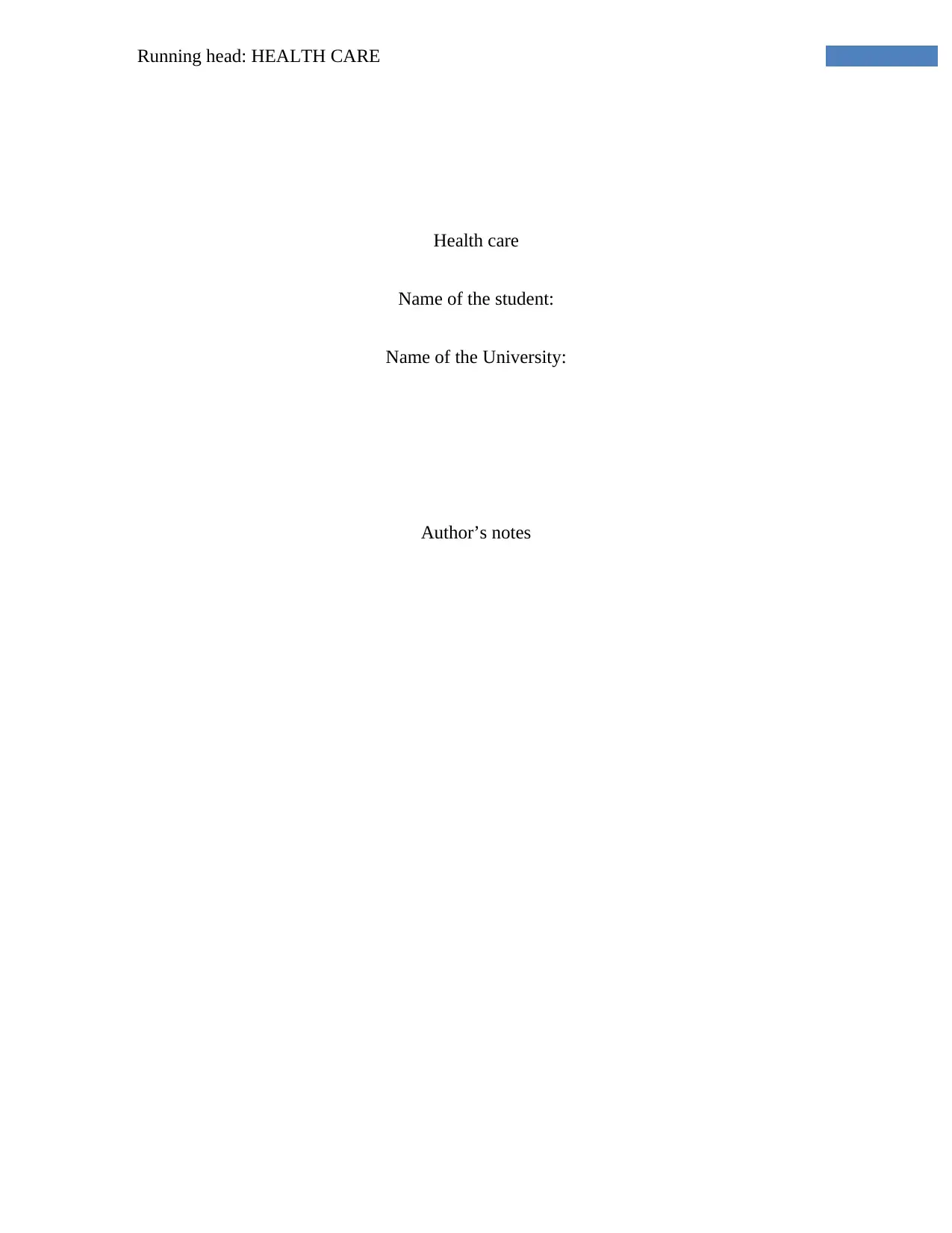
Running head: HEALTH CARE
Health care
Name of the student:
Name of the University:
Author’s notes
Health care
Name of the student:
Name of the University:
Author’s notes
Paraphrase This Document
Need a fresh take? Get an instant paraphrase of this document with our AI Paraphraser
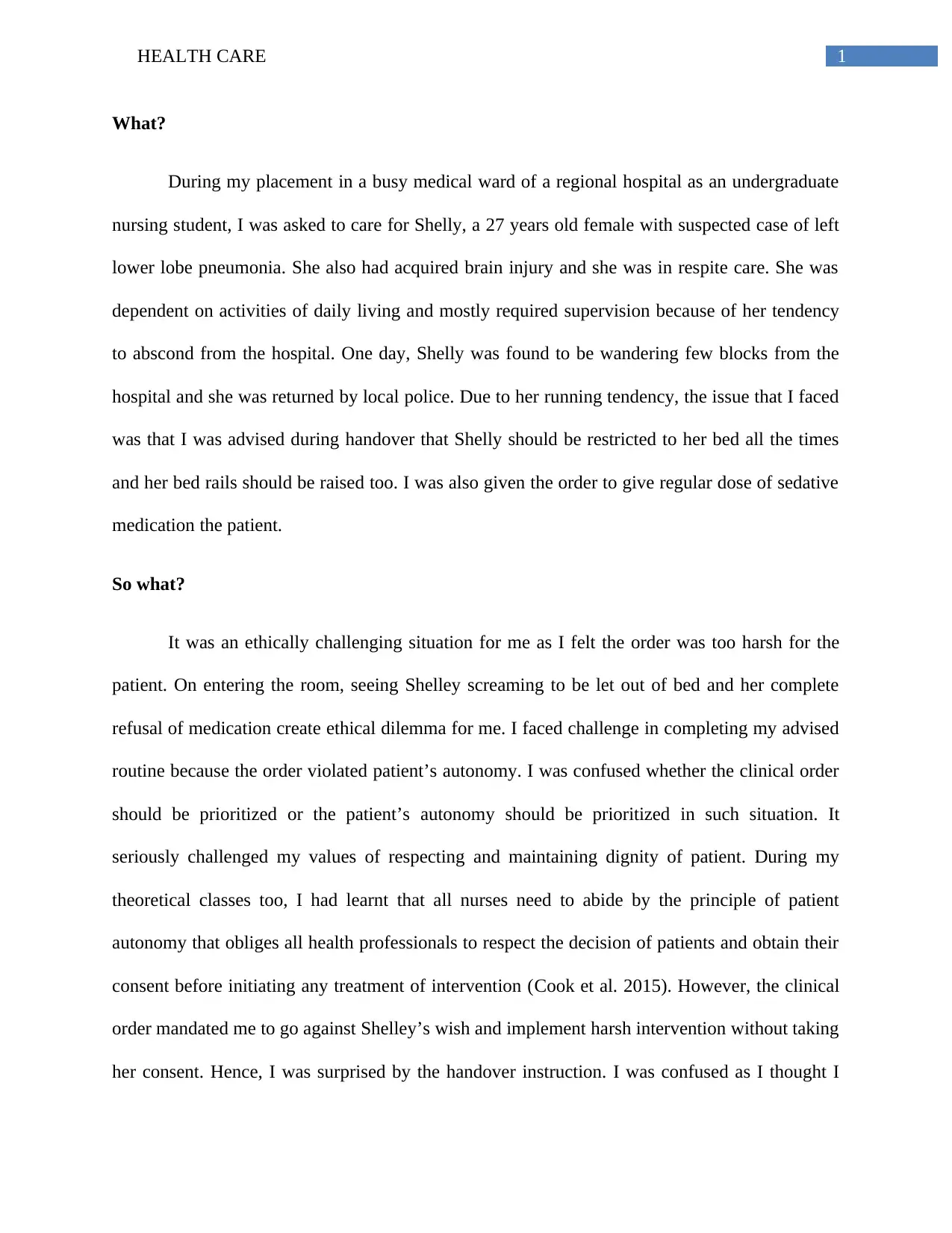
1HEALTH CARE
What?
During my placement in a busy medical ward of a regional hospital as an undergraduate
nursing student, I was asked to care for Shelly, a 27 years old female with suspected case of left
lower lobe pneumonia. She also had acquired brain injury and she was in respite care. She was
dependent on activities of daily living and mostly required supervision because of her tendency
to abscond from the hospital. One day, Shelly was found to be wandering few blocks from the
hospital and she was returned by local police. Due to her running tendency, the issue that I faced
was that I was advised during handover that Shelly should be restricted to her bed all the times
and her bed rails should be raised too. I was also given the order to give regular dose of sedative
medication the patient.
So what?
It was an ethically challenging situation for me as I felt the order was too harsh for the
patient. On entering the room, seeing Shelley screaming to be let out of bed and her complete
refusal of medication create ethical dilemma for me. I faced challenge in completing my advised
routine because the order violated patient’s autonomy. I was confused whether the clinical order
should be prioritized or the patient’s autonomy should be prioritized in such situation. It
seriously challenged my values of respecting and maintaining dignity of patient. During my
theoretical classes too, I had learnt that all nurses need to abide by the principle of patient
autonomy that obliges all health professionals to respect the decision of patients and obtain their
consent before initiating any treatment of intervention (Cook et al. 2015). However, the clinical
order mandated me to go against Shelley’s wish and implement harsh intervention without taking
her consent. Hence, I was surprised by the handover instruction. I was confused as I thought I
What?
During my placement in a busy medical ward of a regional hospital as an undergraduate
nursing student, I was asked to care for Shelly, a 27 years old female with suspected case of left
lower lobe pneumonia. She also had acquired brain injury and she was in respite care. She was
dependent on activities of daily living and mostly required supervision because of her tendency
to abscond from the hospital. One day, Shelly was found to be wandering few blocks from the
hospital and she was returned by local police. Due to her running tendency, the issue that I faced
was that I was advised during handover that Shelly should be restricted to her bed all the times
and her bed rails should be raised too. I was also given the order to give regular dose of sedative
medication the patient.
So what?
It was an ethically challenging situation for me as I felt the order was too harsh for the
patient. On entering the room, seeing Shelley screaming to be let out of bed and her complete
refusal of medication create ethical dilemma for me. I faced challenge in completing my advised
routine because the order violated patient’s autonomy. I was confused whether the clinical order
should be prioritized or the patient’s autonomy should be prioritized in such situation. It
seriously challenged my values of respecting and maintaining dignity of patient. During my
theoretical classes too, I had learnt that all nurses need to abide by the principle of patient
autonomy that obliges all health professionals to respect the decision of patients and obtain their
consent before initiating any treatment of intervention (Cook et al. 2015). However, the clinical
order mandated me to go against Shelley’s wish and implement harsh intervention without taking
her consent. Hence, I was surprised by the handover instruction. I was confused as I thought I
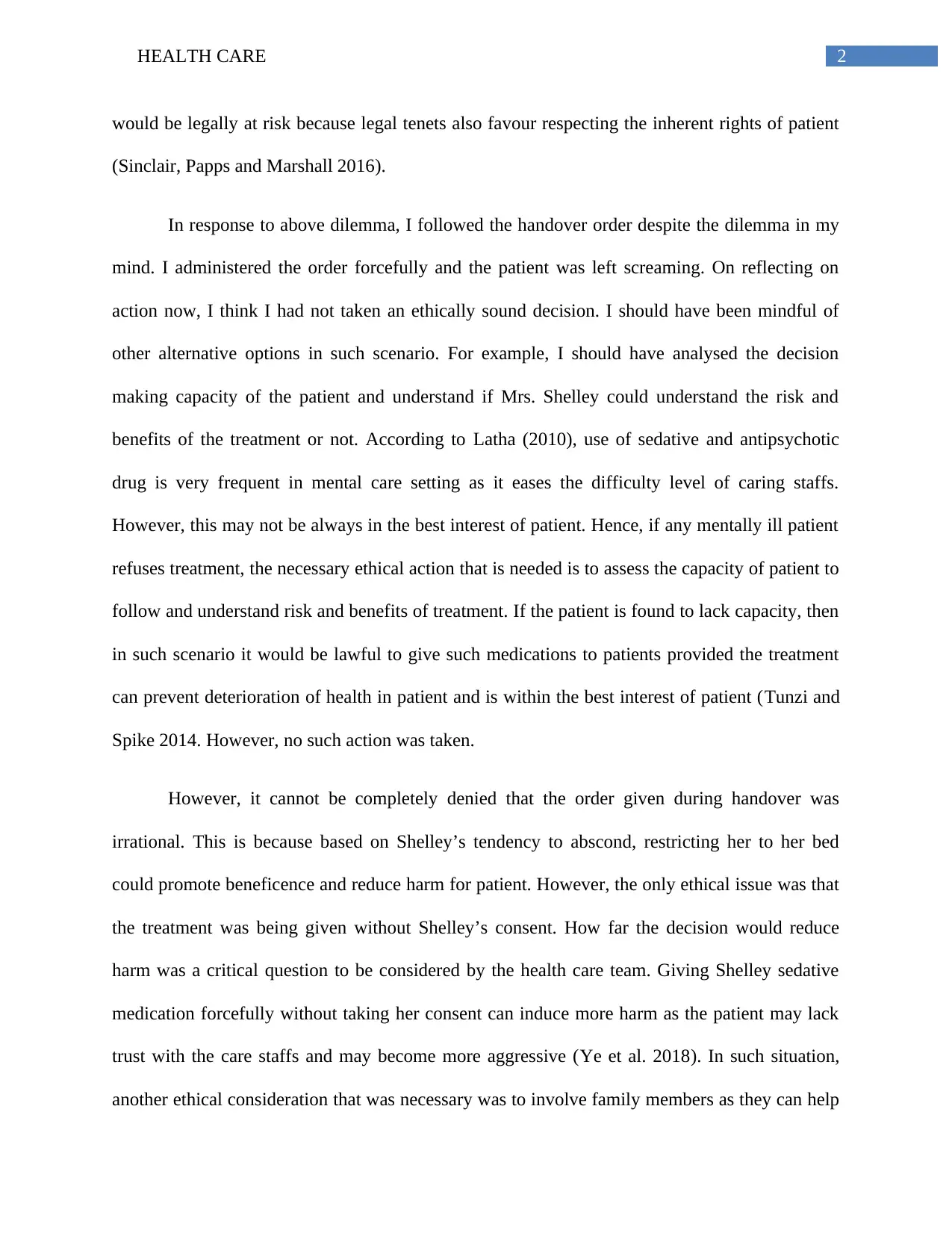
2HEALTH CARE
would be legally at risk because legal tenets also favour respecting the inherent rights of patient
(Sinclair, Papps and Marshall 2016).
In response to above dilemma, I followed the handover order despite the dilemma in my
mind. I administered the order forcefully and the patient was left screaming. On reflecting on
action now, I think I had not taken an ethically sound decision. I should have been mindful of
other alternative options in such scenario. For example, I should have analysed the decision
making capacity of the patient and understand if Mrs. Shelley could understand the risk and
benefits of the treatment or not. According to Latha (2010), use of sedative and antipsychotic
drug is very frequent in mental care setting as it eases the difficulty level of caring staffs.
However, this may not be always in the best interest of patient. Hence, if any mentally ill patient
refuses treatment, the necessary ethical action that is needed is to assess the capacity of patient to
follow and understand risk and benefits of treatment. If the patient is found to lack capacity, then
in such scenario it would be lawful to give such medications to patients provided the treatment
can prevent deterioration of health in patient and is within the best interest of patient (Tunzi and
Spike 2014. However, no such action was taken.
However, it cannot be completely denied that the order given during handover was
irrational. This is because based on Shelley’s tendency to abscond, restricting her to her bed
could promote beneficence and reduce harm for patient. However, the only ethical issue was that
the treatment was being given without Shelley’s consent. How far the decision would reduce
harm was a critical question to be considered by the health care team. Giving Shelley sedative
medication forcefully without taking her consent can induce more harm as the patient may lack
trust with the care staffs and may become more aggressive (Ye et al. 2018). In such situation,
another ethical consideration that was necessary was to involve family members as they can help
would be legally at risk because legal tenets also favour respecting the inherent rights of patient
(Sinclair, Papps and Marshall 2016).
In response to above dilemma, I followed the handover order despite the dilemma in my
mind. I administered the order forcefully and the patient was left screaming. On reflecting on
action now, I think I had not taken an ethically sound decision. I should have been mindful of
other alternative options in such scenario. For example, I should have analysed the decision
making capacity of the patient and understand if Mrs. Shelley could understand the risk and
benefits of the treatment or not. According to Latha (2010), use of sedative and antipsychotic
drug is very frequent in mental care setting as it eases the difficulty level of caring staffs.
However, this may not be always in the best interest of patient. Hence, if any mentally ill patient
refuses treatment, the necessary ethical action that is needed is to assess the capacity of patient to
follow and understand risk and benefits of treatment. If the patient is found to lack capacity, then
in such scenario it would be lawful to give such medications to patients provided the treatment
can prevent deterioration of health in patient and is within the best interest of patient (Tunzi and
Spike 2014. However, no such action was taken.
However, it cannot be completely denied that the order given during handover was
irrational. This is because based on Shelley’s tendency to abscond, restricting her to her bed
could promote beneficence and reduce harm for patient. However, the only ethical issue was that
the treatment was being given without Shelley’s consent. How far the decision would reduce
harm was a critical question to be considered by the health care team. Giving Shelley sedative
medication forcefully without taking her consent can induce more harm as the patient may lack
trust with the care staffs and may become more aggressive (Ye et al. 2018). In such situation,
another ethical consideration that was necessary was to involve family members as they can help
⊘ This is a preview!⊘
Do you want full access?
Subscribe today to unlock all pages.

Trusted by 1+ million students worldwide
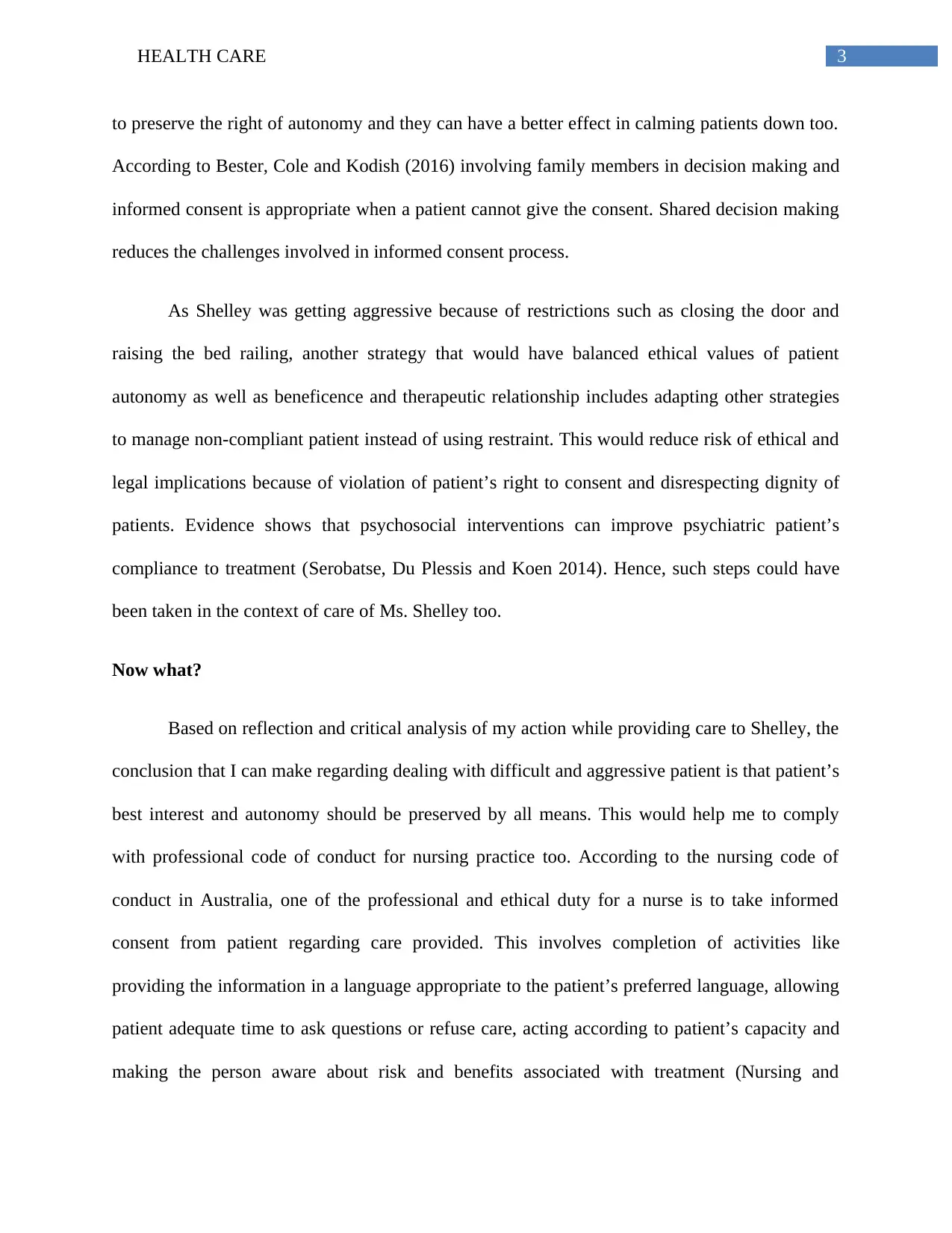
3HEALTH CARE
to preserve the right of autonomy and they can have a better effect in calming patients down too.
According to Bester, Cole and Kodish (2016) involving family members in decision making and
informed consent is appropriate when a patient cannot give the consent. Shared decision making
reduces the challenges involved in informed consent process.
As Shelley was getting aggressive because of restrictions such as closing the door and
raising the bed railing, another strategy that would have balanced ethical values of patient
autonomy as well as beneficence and therapeutic relationship includes adapting other strategies
to manage non-compliant patient instead of using restraint. This would reduce risk of ethical and
legal implications because of violation of patient’s right to consent and disrespecting dignity of
patients. Evidence shows that psychosocial interventions can improve psychiatric patient’s
compliance to treatment (Serobatse, Du Plessis and Koen 2014). Hence, such steps could have
been taken in the context of care of Ms. Shelley too.
Now what?
Based on reflection and critical analysis of my action while providing care to Shelley, the
conclusion that I can make regarding dealing with difficult and aggressive patient is that patient’s
best interest and autonomy should be preserved by all means. This would help me to comply
with professional code of conduct for nursing practice too. According to the nursing code of
conduct in Australia, one of the professional and ethical duty for a nurse is to take informed
consent from patient regarding care provided. This involves completion of activities like
providing the information in a language appropriate to the patient’s preferred language, allowing
patient adequate time to ask questions or refuse care, acting according to patient’s capacity and
making the person aware about risk and benefits associated with treatment (Nursing and
to preserve the right of autonomy and they can have a better effect in calming patients down too.
According to Bester, Cole and Kodish (2016) involving family members in decision making and
informed consent is appropriate when a patient cannot give the consent. Shared decision making
reduces the challenges involved in informed consent process.
As Shelley was getting aggressive because of restrictions such as closing the door and
raising the bed railing, another strategy that would have balanced ethical values of patient
autonomy as well as beneficence and therapeutic relationship includes adapting other strategies
to manage non-compliant patient instead of using restraint. This would reduce risk of ethical and
legal implications because of violation of patient’s right to consent and disrespecting dignity of
patients. Evidence shows that psychosocial interventions can improve psychiatric patient’s
compliance to treatment (Serobatse, Du Plessis and Koen 2014). Hence, such steps could have
been taken in the context of care of Ms. Shelley too.
Now what?
Based on reflection and critical analysis of my action while providing care to Shelley, the
conclusion that I can make regarding dealing with difficult and aggressive patient is that patient’s
best interest and autonomy should be preserved by all means. This would help me to comply
with professional code of conduct for nursing practice too. According to the nursing code of
conduct in Australia, one of the professional and ethical duty for a nurse is to take informed
consent from patient regarding care provided. This involves completion of activities like
providing the information in a language appropriate to the patient’s preferred language, allowing
patient adequate time to ask questions or refuse care, acting according to patient’s capacity and
making the person aware about risk and benefits associated with treatment (Nursing and
Paraphrase This Document
Need a fresh take? Get an instant paraphrase of this document with our AI Paraphraser
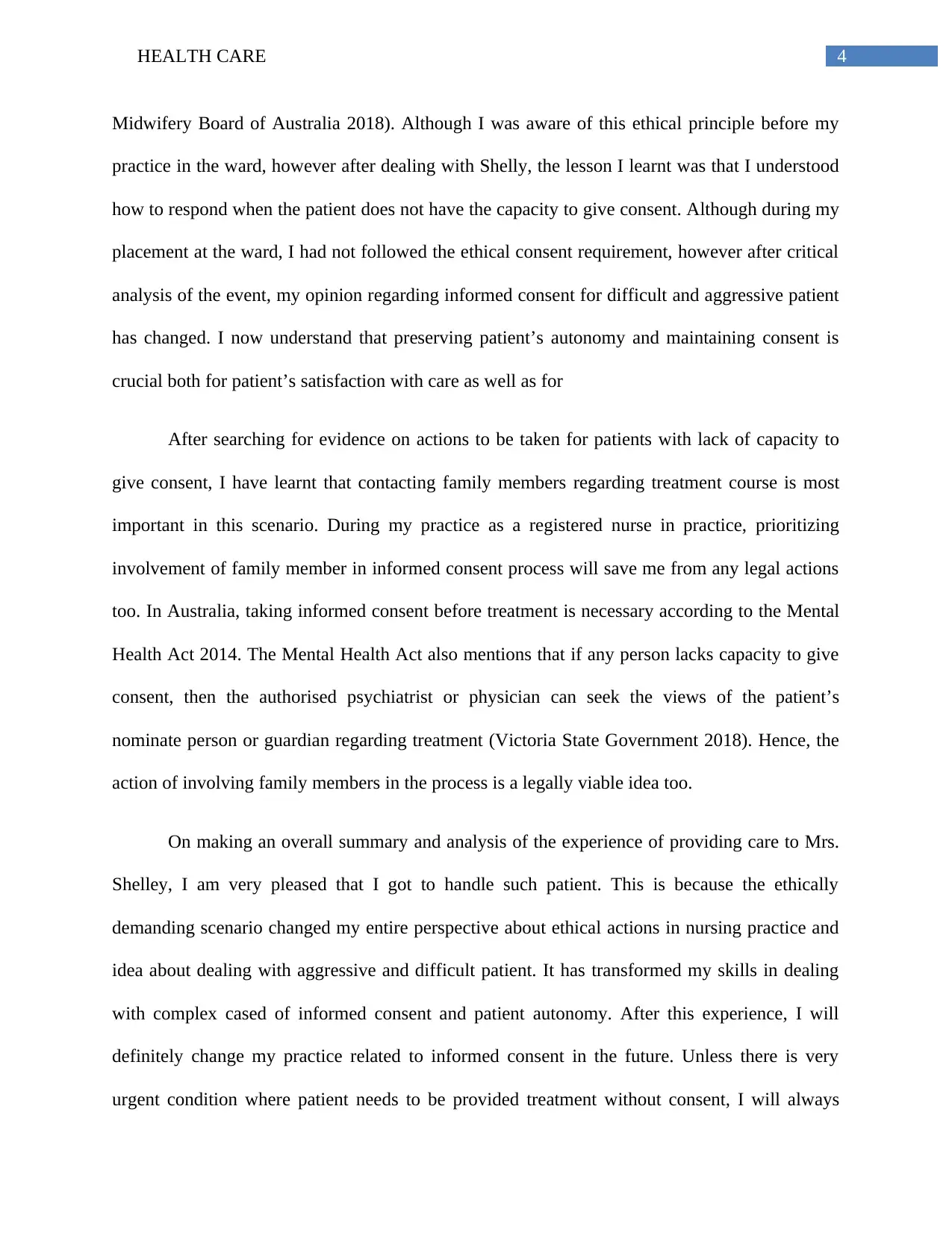
4HEALTH CARE
Midwifery Board of Australia 2018). Although I was aware of this ethical principle before my
practice in the ward, however after dealing with Shelly, the lesson I learnt was that I understood
how to respond when the patient does not have the capacity to give consent. Although during my
placement at the ward, I had not followed the ethical consent requirement, however after critical
analysis of the event, my opinion regarding informed consent for difficult and aggressive patient
has changed. I now understand that preserving patient’s autonomy and maintaining consent is
crucial both for patient’s satisfaction with care as well as for
After searching for evidence on actions to be taken for patients with lack of capacity to
give consent, I have learnt that contacting family members regarding treatment course is most
important in this scenario. During my practice as a registered nurse in practice, prioritizing
involvement of family member in informed consent process will save me from any legal actions
too. In Australia, taking informed consent before treatment is necessary according to the Mental
Health Act 2014. The Mental Health Act also mentions that if any person lacks capacity to give
consent, then the authorised psychiatrist or physician can seek the views of the patient’s
nominate person or guardian regarding treatment (Victoria State Government 2018). Hence, the
action of involving family members in the process is a legally viable idea too.
On making an overall summary and analysis of the experience of providing care to Mrs.
Shelley, I am very pleased that I got to handle such patient. This is because the ethically
demanding scenario changed my entire perspective about ethical actions in nursing practice and
idea about dealing with aggressive and difficult patient. It has transformed my skills in dealing
with complex cased of informed consent and patient autonomy. After this experience, I will
definitely change my practice related to informed consent in the future. Unless there is very
urgent condition where patient needs to be provided treatment without consent, I will always
Midwifery Board of Australia 2018). Although I was aware of this ethical principle before my
practice in the ward, however after dealing with Shelly, the lesson I learnt was that I understood
how to respond when the patient does not have the capacity to give consent. Although during my
placement at the ward, I had not followed the ethical consent requirement, however after critical
analysis of the event, my opinion regarding informed consent for difficult and aggressive patient
has changed. I now understand that preserving patient’s autonomy and maintaining consent is
crucial both for patient’s satisfaction with care as well as for
After searching for evidence on actions to be taken for patients with lack of capacity to
give consent, I have learnt that contacting family members regarding treatment course is most
important in this scenario. During my practice as a registered nurse in practice, prioritizing
involvement of family member in informed consent process will save me from any legal actions
too. In Australia, taking informed consent before treatment is necessary according to the Mental
Health Act 2014. The Mental Health Act also mentions that if any person lacks capacity to give
consent, then the authorised psychiatrist or physician can seek the views of the patient’s
nominate person or guardian regarding treatment (Victoria State Government 2018). Hence, the
action of involving family members in the process is a legally viable idea too.
On making an overall summary and analysis of the experience of providing care to Mrs.
Shelley, I am very pleased that I got to handle such patient. This is because the ethically
demanding scenario changed my entire perspective about ethical actions in nursing practice and
idea about dealing with aggressive and difficult patient. It has transformed my skills in dealing
with complex cased of informed consent and patient autonomy. After this experience, I will
definitely change my practice related to informed consent in the future. Unless there is very
urgent condition where patient needs to be provided treatment without consent, I will always
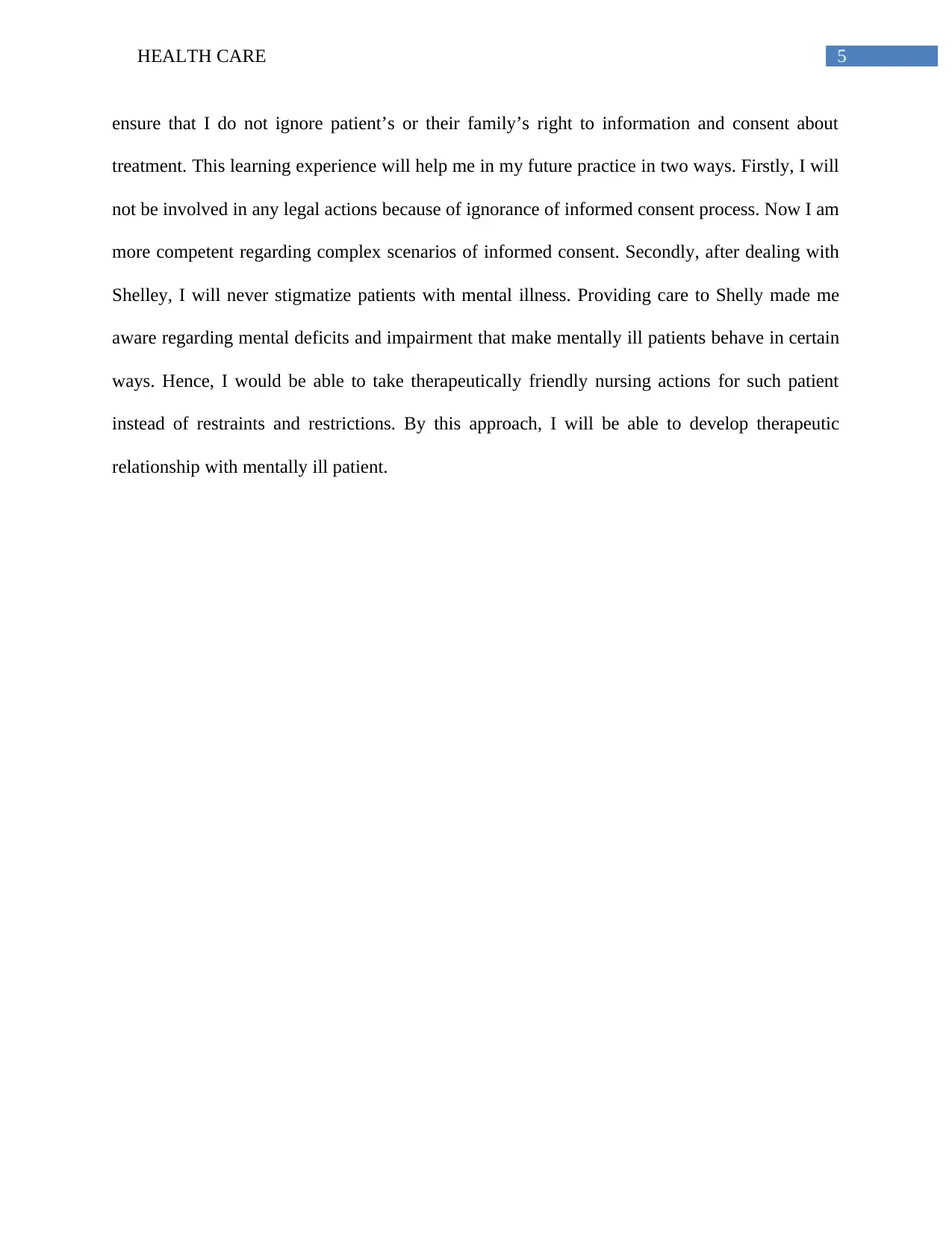
5HEALTH CARE
ensure that I do not ignore patient’s or their family’s right to information and consent about
treatment. This learning experience will help me in my future practice in two ways. Firstly, I will
not be involved in any legal actions because of ignorance of informed consent process. Now I am
more competent regarding complex scenarios of informed consent. Secondly, after dealing with
Shelley, I will never stigmatize patients with mental illness. Providing care to Shelly made me
aware regarding mental deficits and impairment that make mentally ill patients behave in certain
ways. Hence, I would be able to take therapeutically friendly nursing actions for such patient
instead of restraints and restrictions. By this approach, I will be able to develop therapeutic
relationship with mentally ill patient.
ensure that I do not ignore patient’s or their family’s right to information and consent about
treatment. This learning experience will help me in my future practice in two ways. Firstly, I will
not be involved in any legal actions because of ignorance of informed consent process. Now I am
more competent regarding complex scenarios of informed consent. Secondly, after dealing with
Shelley, I will never stigmatize patients with mental illness. Providing care to Shelly made me
aware regarding mental deficits and impairment that make mentally ill patients behave in certain
ways. Hence, I would be able to take therapeutically friendly nursing actions for such patient
instead of restraints and restrictions. By this approach, I will be able to develop therapeutic
relationship with mentally ill patient.
⊘ This is a preview!⊘
Do you want full access?
Subscribe today to unlock all pages.

Trusted by 1+ million students worldwide
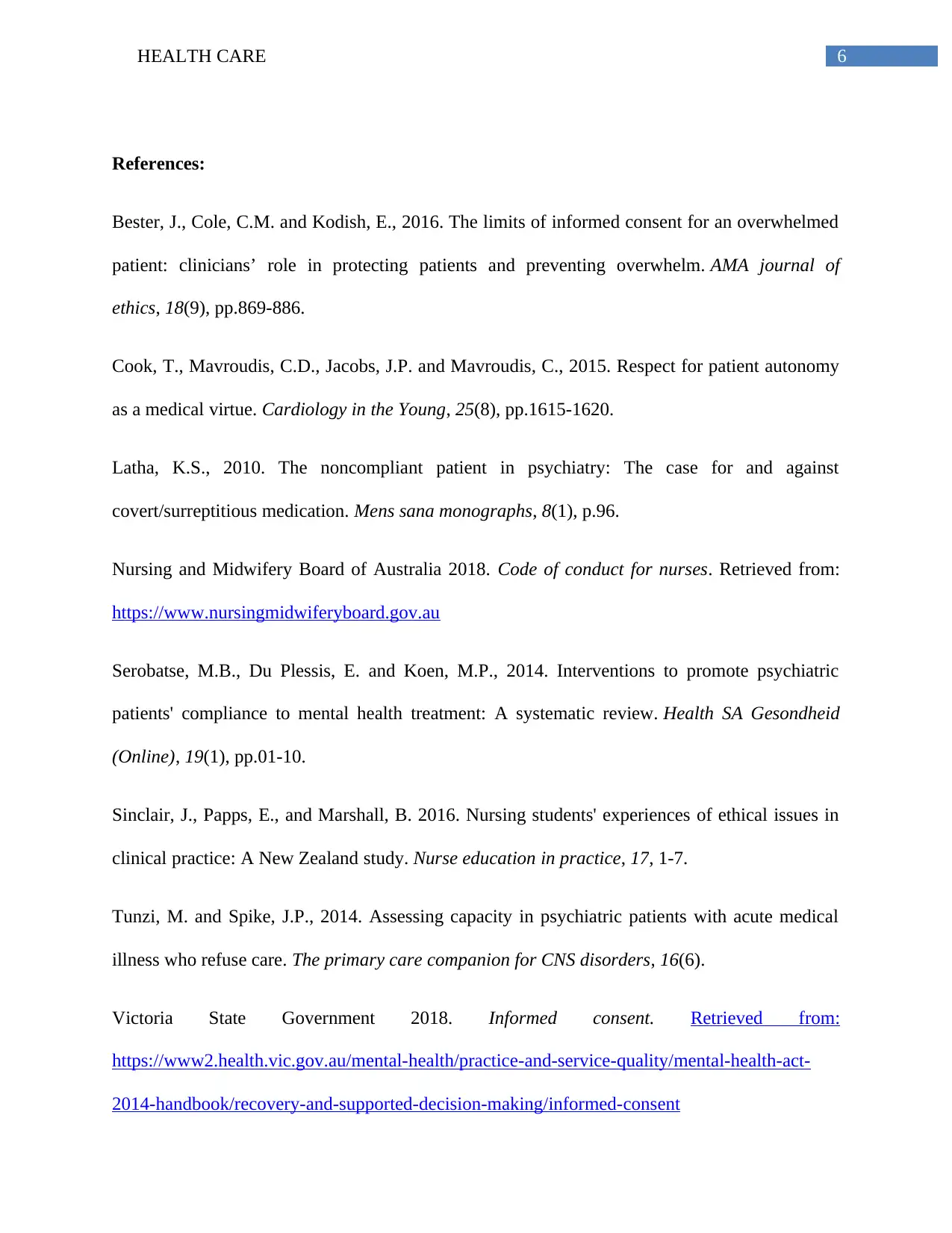
6HEALTH CARE
References:
Bester, J., Cole, C.M. and Kodish, E., 2016. The limits of informed consent for an overwhelmed
patient: clinicians’ role in protecting patients and preventing overwhelm. AMA journal of
ethics, 18(9), pp.869-886.
Cook, T., Mavroudis, C.D., Jacobs, J.P. and Mavroudis, C., 2015. Respect for patient autonomy
as a medical virtue. Cardiology in the Young, 25(8), pp.1615-1620.
Latha, K.S., 2010. The noncompliant patient in psychiatry: The case for and against
covert/surreptitious medication. Mens sana monographs, 8(1), p.96.
Nursing and Midwifery Board of Australia 2018. Code of conduct for nurses. Retrieved from:
https://www.nursingmidwiferyboard.gov.au
Serobatse, M.B., Du Plessis, E. and Koen, M.P., 2014. Interventions to promote psychiatric
patients' compliance to mental health treatment: A systematic review. Health SA Gesondheid
(Online), 19(1), pp.01-10.
Sinclair, J., Papps, E., and Marshall, B. 2016. Nursing students' experiences of ethical issues in
clinical practice: A New Zealand study. Nurse education in practice, 17, 1-7.
Tunzi, M. and Spike, J.P., 2014. Assessing capacity in psychiatric patients with acute medical
illness who refuse care. The primary care companion for CNS disorders, 16(6).
Victoria State Government 2018. Informed consent. Retrieved from:
https://www2.health.vic.gov.au/mental-health/practice-and-service-quality/mental-health-act-
2014-handbook/recovery-and-supported-decision-making/informed-consent
References:
Bester, J., Cole, C.M. and Kodish, E., 2016. The limits of informed consent for an overwhelmed
patient: clinicians’ role in protecting patients and preventing overwhelm. AMA journal of
ethics, 18(9), pp.869-886.
Cook, T., Mavroudis, C.D., Jacobs, J.P. and Mavroudis, C., 2015. Respect for patient autonomy
as a medical virtue. Cardiology in the Young, 25(8), pp.1615-1620.
Latha, K.S., 2010. The noncompliant patient in psychiatry: The case for and against
covert/surreptitious medication. Mens sana monographs, 8(1), p.96.
Nursing and Midwifery Board of Australia 2018. Code of conduct for nurses. Retrieved from:
https://www.nursingmidwiferyboard.gov.au
Serobatse, M.B., Du Plessis, E. and Koen, M.P., 2014. Interventions to promote psychiatric
patients' compliance to mental health treatment: A systematic review. Health SA Gesondheid
(Online), 19(1), pp.01-10.
Sinclair, J., Papps, E., and Marshall, B. 2016. Nursing students' experiences of ethical issues in
clinical practice: A New Zealand study. Nurse education in practice, 17, 1-7.
Tunzi, M. and Spike, J.P., 2014. Assessing capacity in psychiatric patients with acute medical
illness who refuse care. The primary care companion for CNS disorders, 16(6).
Victoria State Government 2018. Informed consent. Retrieved from:
https://www2.health.vic.gov.au/mental-health/practice-and-service-quality/mental-health-act-
2014-handbook/recovery-and-supported-decision-making/informed-consent
Paraphrase This Document
Need a fresh take? Get an instant paraphrase of this document with our AI Paraphraser
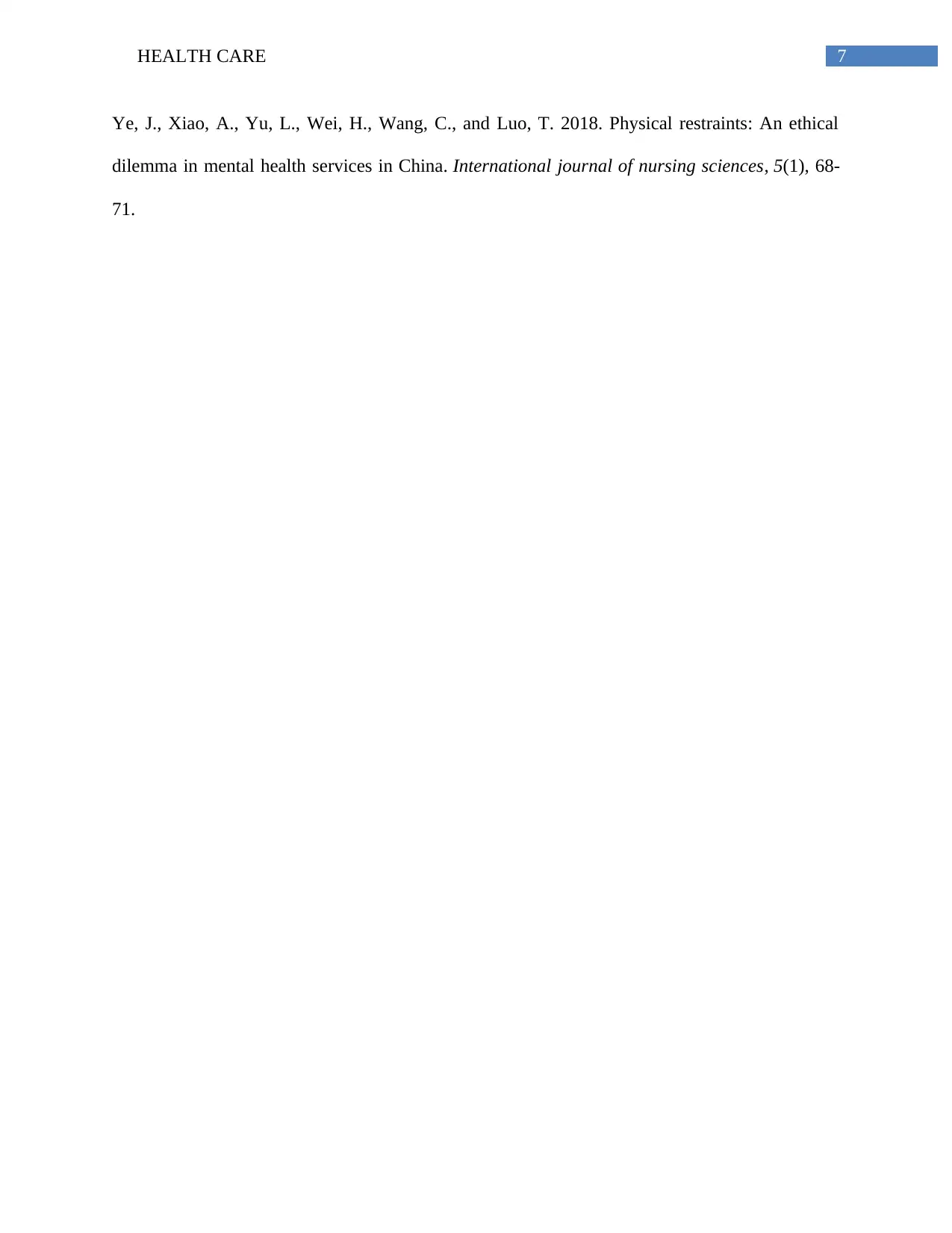
7HEALTH CARE
Ye, J., Xiao, A., Yu, L., Wei, H., Wang, C., and Luo, T. 2018. Physical restraints: An ethical
dilemma in mental health services in China. International journal of nursing sciences, 5(1), 68-
71.
Ye, J., Xiao, A., Yu, L., Wei, H., Wang, C., and Luo, T. 2018. Physical restraints: An ethical
dilemma in mental health services in China. International journal of nursing sciences, 5(1), 68-
71.
1 out of 8
Related Documents
Your All-in-One AI-Powered Toolkit for Academic Success.
+13062052269
info@desklib.com
Available 24*7 on WhatsApp / Email
![[object Object]](/_next/static/media/star-bottom.7253800d.svg)
Unlock your academic potential
Copyright © 2020–2026 A2Z Services. All Rights Reserved. Developed and managed by ZUCOL.





